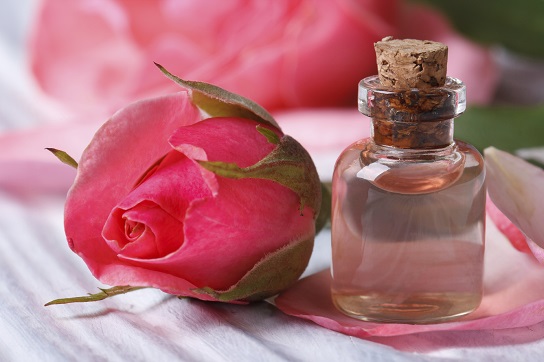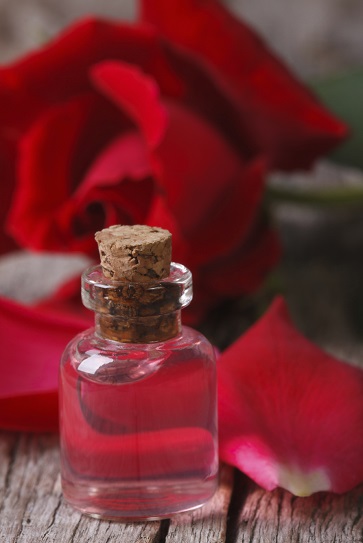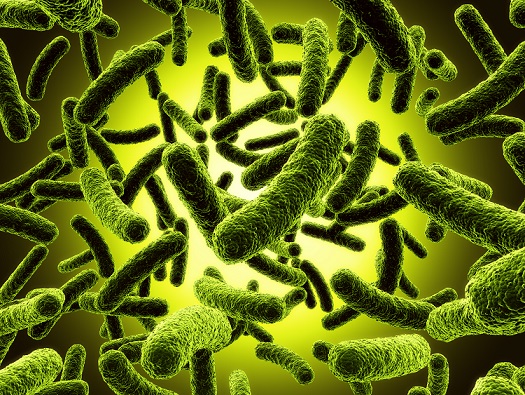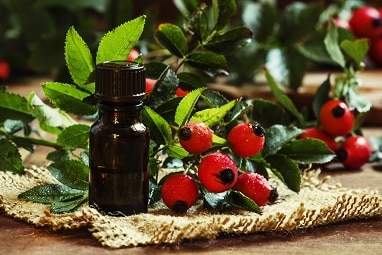 Rose water is a scented and pink liquid made from distilling rose flower petals into water. It’s approximately 10-50% rose oil by weight, but that oil itself contains countless active compounds, including geraniol, and phenylethyl alcohol, which provides the rose taste and fragrance.
Rose water is a scented and pink liquid made from distilling rose flower petals into water. It’s approximately 10-50% rose oil by weight, but that oil itself contains countless active compounds, including geraniol, and phenylethyl alcohol, which provides the rose taste and fragrance.
Supposedly, it takes 50,000 rose flowers to make just a single ounce of pure rose oil, which sounds like a terrible business idea, but nevertheless, this product is popular worldwide.
Traditionally rose water is used to flavour dairy, candies like Turkish delight, and cultural dishes like nougat and baklava in the Middle East, India and Pakistan. Rose water has ceremonial usage too, as Muslims on the Indian subcontinent commonly spray open graves with rose water before burying their dead. Rose water is often sprinkled in Indian weddings to welcome the guests.
As for acne, rose water is somehow a staple among Middle Eastern professional dermatologists, just like benzoyl peroxide is in the US. In East Asia, it’s a standard treatment for dermatitis, an inflammatory skin disease with similar roots to acne.
This topical treatment might look pink and lovely and colourful, but will rose water make your acne look great too? Or is it just a deceptively pretty waste of time? Read on and find out.
Rose water lowers inflammation via a unique mechanism
 If you wish to clear acne, prevent acne from ever appearing in the first place, and get radiant and glowing skin that’s the envy of the world, then you have one all-important strategy: lowering inflammation.
If you wish to clear acne, prevent acne from ever appearing in the first place, and get radiant and glowing skin that’s the envy of the world, then you have one all-important strategy: lowering inflammation.
The red and angry pimples that make your face look like a mess are the result of an insane immune system that pumps out far too many inflammatory chemicals. It’s not just your teenage hormones and stress, and it’s not your genetics, no generic concepts like that. Your acne has a specific cause.
That’s why rose water is such a fantastic topical treatment. Rose water can reduce the inflammatory chemicals on your skin’s surface, but it also does so through an especially useful mechanism.
Our first excellent study tested Algerian rose oil, also known as geranium oil. 5 groups of rats had their paws inflamed using carrageenan, a classic substance for purposefully triggering inflammation in studies.
Read Annihilate Your Acne – get the ultimate diet and clear your acne permanently!
The results were very promising for acne. Oral administration of rose oil, in concentrations of 100mg, 200mg, and 400mg, decreased the inflammatory paw swelling by 30%, 38% and 73% respectively. In fact, rose oil’s anti-inflammatory powers were comparable to diclofenac, a non-steroidal anti-inflammatory drug. Rose oil is the main active component of rose water.
That proves its overall anti-inflammatory powers then, but what we’re interested in is topical application. Once again, there’s fantastic news: after deliberately inflaming the mice’s ears with croton oil and applying 5ul and 10ul of rose oil per ear, inflammatory swelling fell by 73% and 88% respectively.
Closer analysis of immune system chemicals confirmed that the rose oil directly inhibited inflammatory responses in the skin. The scientists concluded that “rose geranium essential oil may have significant potential for the development of novel anti-inflammatory drugs”.
Rose water blocks acne-causing neutrophils
 So that’s excellent evidence that rose oil and by extension rose water can inhibit inflammation, and do so superbly. When translated to your acne, 73% and 88% are very strong reductions.
So that’s excellent evidence that rose oil and by extension rose water can inhibit inflammation, and do so superbly. When translated to your acne, 73% and 88% are very strong reductions.
This 2004 study was similarly outstanding, but this time there’s an extra acne clearing twist. Again, scientists were testing geranium oil, AKA poor man’s rose oil from Algeria, which has a different composition of active chemicals but still contains the powerful ones like geraniol. Several groups of mice were injected with casein to purposefully inflame their skin. The scientists then tested four essential oils – geranium oil (rose oil), tea tree oil, spearmint oil, and lemongrass oil.
Vitamin E – the ultimate nutrient for clogged pores
Once again, the rose oil was strongly anti-inflammatory overall, but better, it specifically reduced immune system chemicals called neutrophils. That’s fantastic news for all acne patients for two reasons.
Firstly, neutrophils act as a recruitment officer for other inflammatory chemicals; they trigger leukocyte recruitment to the site of any infection, including our foe acne. Ending that process can work wonders itself. Rose oil lowered the leukocyte recruitment triggered by neutrophils to 70.2% of the control patients. Rose oil was far more potent than tea tree oil, which didn’t inhibit neutrophils at all.
Secondly and most importantly, neutrophils have the job of churning out free radicals, chiefly to break down damaged tissues. This readies them for replacement, but when your immune system pumps out too many neutrophils, the healthy tissues of your skin are assaulted too.
Furthermore, the free radicals can spread everywhere. When they do, they oxidise a component of your skin’s oil (sebum) called squalene and turn it into squalene peroxide, the most comedogenic (pore blocking) substance on the planet. This little known villain triggers a localised increase in both sebum production and dead skin cell proliferation. Scientists can create acne in no time simply by applying squalene peroxide to a rabbit’s ear.
Free radical overload, whether from cigarette smoke, air pollution or a crappy modern diet, is a hidden menace behind almost everyone’s acne, and rose water can end the stream from rampaging neutrophils.
The evidence for rose water never seems to end:
ONE: this study also found that rose water inhibited neutrophil activity. Furthermore, it achieved this by inhibiting tumour necrosis factor alpha (TNF-a), another vicious inflammatory chemical which is causing acne worldwide. Geranium (rose) oil was the best essential oil tested, easily beating tea tree oil and lavender oil. Tea tree oil has a strong overall anti-inflammatory effect (see this article), but the power to inhibit neutrophils seems specific to rose water.
TWO: this study tested swollen and inflamed mouse paws again. Rose oil reigned supreme, beating several other essential oils. Rose oil could suppress both acute (temporary) inflammation and chronic (never-ending) inflammation.
Despite being almost ignored by mainstream acne gurus, rose water is clearly an anti-inflammatory goldmine.
Rose water kills acne bacteria with few side effects
 Killing p.acnes bacteria is held up to be the cornerstone of clearing acne; hence why dermatologists are so obsessed with benzoyl peroxide. Well, raw honey and blue light devices are actually superior, because BP worsens your acne in the long run. P.acnes isn’t the only cause of acne anyway, since you have to soothe the inflammatory response against that p.acnes. But nevertheless, killing p.acnes bacteria is a terrific secondary strategy…
Killing p.acnes bacteria is held up to be the cornerstone of clearing acne; hence why dermatologists are so obsessed with benzoyl peroxide. Well, raw honey and blue light devices are actually superior, because BP worsens your acne in the long run. P.acnes isn’t the only cause of acne anyway, since you have to soothe the inflammatory response against that p.acnes. But nevertheless, killing p.acnes bacteria is a terrific secondary strategy…
…and that’s exactly what rose water can do. One study found that rose essential oil was effective against 14 out of 15 bacterial strains tested, including Klebsiella pneumoniae, Salmonella enteritidis, and Staphylococcus aureus. Only e.coli put up any resistance.
In this 2002 study, rose oil wiped out Staphylococcus aureus once again, a secondary acne-causing bacteria that inflames the skin and is strongly linked to eczema and dermatitis. Its powers were comparable to lavender oil and peppermint oil.
Recommended – the top 6 vitamins and minerals for acne-free skin
Then there’s this study testing several varieties of rose oil, including Rose Absolute, rose essential oil, and hydrosol extracted from rose oil. This time, rose oil did kill E.coli, and a whole lot more: Pseudomonas aeruginosa, B. subtilis, Staph. aureus, Chromobacterium violaceum and Erwinia carotovora.
Does rose water kill p.acnes bacteria specifically? I cannot say for sure, but the evidence is nearly overwhelming considering the large variety of bacteria inhibited. Rose water inhibited strains from both the gram positive and gram negative classes (p.acnes is gram positive), so the potential is huge.
Does rose water have secret side effects?
What about side effects then, such as the burns and irritation often observed with essential oils like tea tree and thyme oil? The good news is that rose water doesn’t seem to have any. Stories of burns and rashes, for instance, are uncommon.
There is one suspicious fact: the main active component, geraniol, is known to be a “severe eye irritant”. But Indian Ayurvedic Medicine has recommended rose water as a cleansing eye drop for hundreds of years, so a healthy compound must be counteracting the harm. Indians have also used rose water as a facial cleaner for centuries.
The only scientific evidence lies in an oft-referenced British study conducted 40 years ago. Apparently, applying rose water to acne-prone skin increased sebum production. That would be a nightmare, since sebum is the oil that clogs your pores.
But that finding has never been repeated. Nor is there any anecdotal evidence. I cannot even confirm whether the study is real. Also, the scientists were specifically testing rose water’s hydration properties, so it’s likely that they selected patients with unusually dry skin and rose water just normalised it.
The top 7 topical treatments for clearing acne naturally
Some websites also suggest that rose water increases keratin, the protein that glues dead skin cells together and helps them block your pores. But again, the evidence is flimsy, and in fact, rose water might encourage normal keratinocyte differentiation. It pales in the face of all the fantastic anti-inflammatory and antibacterial studies.
The verdict
While it’s true that rose water has never been tested directly on acne, its potential is massive. There are few acne testimonials on the internet, so you could be the first to discover a miracle. Again, East Asians have been using rose water for dermatitis for eons.
If you want to give it a shot then I recommend this Alteya Organics Rose Water.
This brand is organic with no dodgy additives, and no sneakily added oils which dilute the effectiveness. It’s also free from inflammatory BPA. This is rose water in its purest form.
Dosage-wise, there’s no need for fear and trepidation, since it doesn’t have the side effects of tea tree oil when applied liberally. You can try rose water both as a whole face cleanser or as a targeted treatment for an inflamed individual pimple. Since rose water is relatively undocumented among acne patients, it’s possible that a random compound will give you an allergic reaction, but such an outbreak would probably only be temporary.
There’s also one aspect we haven’t discussed – the long history of rose water as a tasty food flavouring.
Why using raw honey could revolutionise your skin
American and European bakers everywhere once relied on rose water as their default ingredient, until vanilla took over in the mid-19th century. Rose water is used everywhere in Middle Eastern and Iranian cuisine, in dishes like nougat, gumdrops, baklava, and raahat. In Malaysia and Singapore, red tinted rose water is mixed with milk, which then turns pink to form a sweet drink called Bandung. Rose water is even added to lemonade in parts of the Middle East.
In the British Premier league, Muslim footballers who don’t want to drink champagne during celebrations are often given rose water instead. Rose water is also used as a Halal substitute for red wine and other alcohol in Muslim cooking.
As for health, East Asians use rose water for treating intestinal inflammation, and it’s mentioned in ancient Indian ayurvedic medicine constantly. Rose water is also believed to combat depression. I’ve read that the scent may actually stimulate happiness hormones like serotonin, which could be why the rose flower is the symbol of love.
What about rosehip seed oil?

If this article has ignited something in your brain and given you a sudden realisation that rose water is what you need, do not fall into the trap of buying rosehip seed oil.
On online vendors, typing in rose water will yield numerous different brands of rosehip oil instead, but they’re completely different topical treatments. Rosehip seed oil is a fatty oil derived from the rose bush’s rosehips, as you might guess, while rose water is a diluted essential oil from the rose flower’s petals. There’s also rose oil, an undiluted, massively more concentrated rose water.
The effects are also completely different, as only rose water can provide the rare anti-inflammatory properties, but rosehip seed oil is also promising.
The first indisputable benefit is its fatty acid profile, which is approximately 21% linolenic acid, 54% linoleic acid, 19% oleic acid, and 5% stearic acid. That’s perfect for an acne-friendly moisturiser, high in the hydration restoring linoleic acid, and low in the irritating and destabilising oleic acid. Use rosehip seed oil and you can wave chemical-filled grocery store moisturisers goodbye. Rosehip seed oil also has a comedogenic rating of just 1, compared to 4 for coconut oil.
One particularly promising study tested wound healing in 108 post-operation Spanish patients. After 12 weeks, 63% of the rosehip seed oil patients had no discoloration, compared to 21% of the controls. There were no adverse effects, and the scientists concluded that “rosehip oil is useful for cosmetic improvement“. This wasn’t conducted on acne, but the bodily processes which heal dying acne and other wounds are very similar.
Then there’s the classically hyped up feature, rosehip seed oil’s richness in a naturally occurring form of vitamin A called trans-retinoic acid. This is structurally different to the synthetic vitamin A of prescription retinoids, and the beta-carotene form found in sweet potatoes, but the result is identical: decreased sebum production and less oily skin.
Rosehip seed oil is also among the denser topical treatments for carotenoid antioxidants, and a less known compound is beta-sitosterol. Also found in sea buckthorn berry oil, beta-sitosterol is a natural plant steroid, which prevents androgenic hormones like DHT from binding to your sebaceous glands and stimulating oil production. Rosehip seed oil battles oily skin on two fronts. Then there’s its 783.55 µg content of a powerful phenolic antioxidant called p-coumaric acid.
Why dairy can either destroy your skin or improve it
There is, however, a belief that rosehip seed oil is incredibly rich in vitamin C, but that’s a myth, because vitamin C is water soluble. Whole rosehips rank alongside camu camu berries as the richest vitamin C sources on Planet Earth, but none of this makes it into the fatty oil; it remains behind in the plant fibers. Regardless, rosehip seed oil probably fantastic for acne and definitely fantastic for moisturising.
An excellent product is this Fushi Organic Rosehip Seed Oil, which is cold-pressed and unrefined, and free from any harsh solvents like hexane. Ideally, rosehips should be grown in colder climates, and Fushi’s are grown in the high mountains of Ukraine.
Despite its popularity, rosehip seed oil is still fairly unresearched, so with its massive nutritional density, anti-inflammatory and antibacterial powers could easily emerge yet.
Conclusion
As we’ve discussed hundreds of times on this website, trying to cure acne with face washes and cleansers alone is a fool’s errand.
You absolutely must eat a healthy diet, and tackle lifestyle factors such as your vitamin D levels, stress levels, sleep quality and exercise. You have to treat the root causes of acne rather than simply treating the problem itself.
That said, topical treatments are a great secondary strategy for those acne clearing fanatics who want to push things to the limit….
…and alongside honey, grapeseed oil, royal jelly, and tea tree oil, rose water is one of the best topical treatments you could use.
NEXT: get the complete strategy for clearing acne naturally
Thanks for reading!
Can it be any kind of rose water of a specific one ?
It has to have the basics covered; e.g. it needs to be rose petals with all their oils and compounds distilled into a treatment.
Is rose otto oil eqivalent?